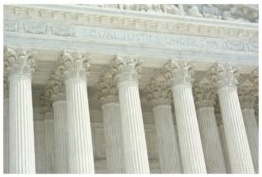 Developers of new digital technologies that store and transmit data to customers around the world suffered a major set back on June 25, 2014 in the United States Supreme Court Copyright Act Decision in American Broadcasting Cos., Inc. v. Aereo, Inc. The court found that Aereo infringed broadcasters’ copyrights by providing its customers with access to public TV programming over the Internet via individualized antennas owned and operated by the company in the cloud. The decision deals a serious blow to Aereo’s future, and to other innovators that develop technologies that store and transmit, in real or near-real time, over-the-air television broadcasts to customers and deliver content and services via the cloud.
Developers of new digital technologies that store and transmit data to customers around the world suffered a major set back on June 25, 2014 in the United States Supreme Court Copyright Act Decision in American Broadcasting Cos., Inc. v. Aereo, Inc. The court found that Aereo infringed broadcasters’ copyrights by providing its customers with access to public TV programming over the Internet via individualized antennas owned and operated by the company in the cloud. The decision deals a serious blow to Aereo’s future, and to other innovators that develop technologies that store and transmit, in real or near-real time, over-the-air television broadcasts to customers and deliver content and services via the cloud.
Aereo’s business is built around two products: mini-antennas assigned to each customer and stored at Aereo’s warehouses, and a digital video recorder with a large storage capacity on Aereo’s servers, which acts as a private cloud service. At a customer’s request, Aereo captures the signal from a specific over-the-air television broadcast, saves the data into the customer’s unique folder on Aereo’s servers, and then streams the content to the customer’s computer, mobile phone or other device with only a few seconds of delay. If the user wishes to watch the recorded program at a later time, Aereo stores the recording on its server and streams it to the customer at a requested time.
The issue with which the Supremes grappled was whether Aereo’s acts of capturing and streaming local TV programs to customers via the Internet constituted a public performance under the Copyright Act. If it did, those actions would infringe on the broadcasters’ copyrights in the programs’ content. The Copyright Act of 1976 clarified that “transmission” of a copyrighted work to the public “by means of any device or process” constitutes a public performance of that work. Congress amended the Act in 1976, in part, to amend the “transmission” clause so as to overturn two Supreme Court decisions that found the cable television industries retransmission of network broadcasts did not fall within the ambit of the Copyright Act.
The 1976 Act requires the person transmitting the signal to pay broadcasters to transmit programing to subscribers. Despite the significant differences between the technologies used in the early 1970s to transmit programming (i.e., cable television) and Aereo’s capture, storage, and streaming technology, the Supremes found that Aereo’s streaming services were sufficiently similar to cable television’s transmission services and thus constituted a public performance under the Copyright Act. Because Aereo failed to secure licenses from broadcasters to transmit their content the court found the company’s streaming services infringed the broadcaster’s copyrights.
Despite Aereo’s deployment of a complex transmission system carefully designed to avoid copyright infringement, the Supremes found the company could be liable for direct infringement on the ground that Aereo, not merely its customers, had “performed” the copyrighted works, and those performances were “public.” The decision, which was written by Justice Breyer, appears to be driven by the court’s sense that Aereo’s viewing service was essentially the same as cable TV and thus a a contrary result would be inconsistent with Congress’s intent, when it amended the Copyright Act in 1976, to apply copyright restrictions to cable.
The court was quite careful to restrain the reach of its decision and leave many issues about other new technologies unanswered, including the impact on cloud computing, remote DVR and cloud storage services. The court added several comments emphasizing the limited reach of its decision:
- An entity “only transmits a performance when it communicates contemporaneously perceptible images and sounds of a work,” as opposed, for example, to distribution of DVDs which the recipients might perform.
- The court noted that its ruling on the scope of “the public” does not include those who act as owners or lawful possessors of a product. Moreover, the decision does not consider “whether the public performance right is infringed when the user of a service pays primarily for something other than the transmission of copyrighted works, such as remote storage of content.”
- The court stated that questions involving cloud computing, remote storage DVRs, and other novel technological issues were not before the court, and given that Congress may not have established rules for those technologies, should await other cases that squarely addresses each of those issues.
- The court’s analysis may not apply to Aereo’s other services like time shifting, which functions more like a remote DVR than a contemporaneous re-transmission by cable TV.
In light of the court’s decision, and its specific comments on the limits of its holding, its unclear how the Supremes might apply the decision, if at all, in future cases that raise the question of whether existing or future technologies violate the Copyright Act. However these questions are resolved, the Supremes’ decision appears likely to doom the “view” functionality of Aereo’s Internet and mobile device transmission service.
